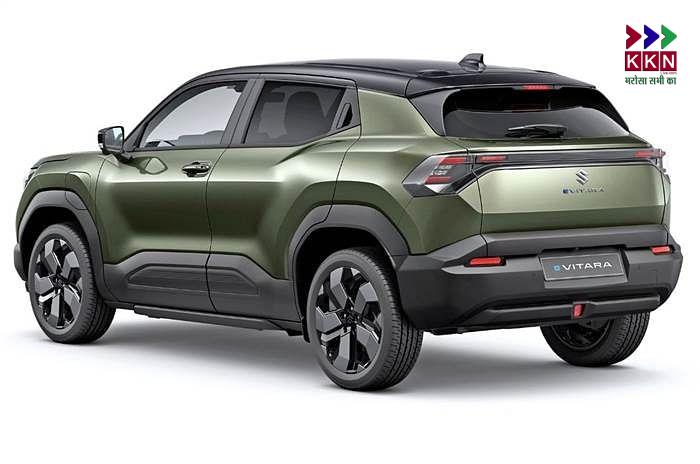
India’s largest carmaker Maruti Suzuki has officially entered the electric vehicle market with its first battery electric SUV, the Maruti Suzuki eVitara. Prime Minister Narendra Modi flagged off the very first production unit from the company’s Hansalpur plant in Gujarat. The much-awaited SUV will launch in the Indian market on September 3, 2025, marking a historic milestone for both Maruti Suzuki and India’s electric mobility vision.
Maruti Suzuki’s Bold Entry into Electric Mobility
For decades, Maruti Suzuki has dominated India’s automotive sector with petrol and diesel cars. Now, as the global market shifts towards green mobility, Maruti Suzuki has taken a decisive step with the eVitara. This marks the company’s formal debut in the EV segment, an area where rivals like Tata Motors, Mahindra, and MG have already built strong portfolios.
By entering this space, Maruti is not only catching up but aiming to set new benchmarks. With its first electric SUV, the brand is promising a combination of range, performance, safety, and affordability.
Global Ambitions from Day One
The eVitara is not designed only for Indian customers. Maruti Suzuki has planned the SUV as a global product that will be exported to over 100 countries soon after its launch.
The global outlook reflects Suzuki Motor Corporation’s strategy to establish a stronger position in the worldwide EV race. At the flag-off event, Gujarat Chief Minister Bhupendra Patel and Japan’s Ambassador to India Keiichi Ono were present, highlighting the international importance of the model.
Battery Options and Powertrain Configurations
Maruti Suzuki is offering two battery pack choices for the eVitara, designed for different driving needs.
The first option is a 49 kWh battery pack. It powers a front-wheel-drive motor producing 142 bhp and 193 Nm torque. With this configuration, the SUV promises a driving range of up to 344 kilometers on a single charge.
The second, more powerful option is a 61.1 kWh battery pack. Buyers will get two configurations here. In the front-wheel-drive version, the motor produces 171 bhp and 193 Nm torque, delivering a range of 426 kilometers. For those seeking more power and grip, an all-wheel-drive variant is also available. It offers 181 bhp and 307 Nm torque, though with a slightly lower range of 395 kilometers.
This variety ensures that customers can choose between efficiency and performance, depending on their preferences.
Charging Times and Options
Charging convenience is a critical factor for electric vehicles. Maruti Suzuki has provided multiple charging solutions for the eVitara.
The 49 kWh battery pack charges in 6.5 hours using a 7 kW AC charger. With an 11 kW charger, the time drops to 4.5 hours.
The larger 61.1 kWh pack requires 9 hours with a 7 kW charger and 5.5 hours with an 11 kW charger. Both versions support DC fast charging, which can recharge the battery from 0 to 80 percent in just 45 minutes.
This flexibility means owners can charge at home overnight or top up quickly at public charging stations.
Interior Design and Premium Features
Inside, the eVitara focuses on comfort, technology, and a modern driving experience. The cabin features a dual-screen setup, with a 10.1-inch touchscreen for infotainment and a 10.25-inch digital cluster for driving information.
Other highlights include a panoramic sunroof, ventilated front seats, wireless charging, and semi-leather upholstery. The driver’s seat offers 10-way power adjustment, providing added convenience.
These features aim to make the SUV competitive against rivals like the Hyundai Creta EV, Tata Curvv EV, and MG ZS EV.
Safety Features with Advanced Technology
Safety has been a key highlight of the eVitara. The SUV is equipped with seven airbags to ensure passenger protection in case of collisions. A 360-degree camera enhances visibility for city driving and parking.
The vehicle also includes ADAS (Advanced Driver Assistance System) features. These systems bring functions like lane-keeping assist, adaptive cruise control, and collision warning, making the SUV safer for both highways and crowded urban environments.
By including ADAS, Maruti Suzuki is signaling its intent to match international standards in vehicle safety.
Competitive Pricing and Rivals
Although official pricing will be revealed at the September 3 launch, industry expectations place the eVitara between ₹17 lakh and ₹26 lakh. This puts it directly against strong rivals in the mid-size electric SUV space.
Competitors include Tata Curvv EV, Mahindra XEV 9e, Mahindra BE 6, MG ZS EV, and Hyundai Creta EV. Each of these models has already built its presence in the market.
Maruti Suzuki’s strong dealership network and trusted after-sales service could give eVitara a crucial advantage over these rivals.
Why eVitara Matters for Maruti Suzuki
Maruti Suzuki has long dominated the petrol and CNG segments in India but has been criticized for its delayed EV entry. The launch of the eVitara addresses that gap.
With rising fuel costs and government incentives for EV adoption, this model could help Maruti maintain leadership in the evolving market. It also strengthens Suzuki’s commitment to reducing emissions and supporting India’s sustainable development goals.
The SUV’s export plans further establish Maruti Suzuki as not just an Indian giant but a global EV player.
Customer Expectations and Market Impact
Customers are eagerly waiting to see how Maruti delivers on its promises. Range anxiety, charging infrastructure, and safety are top concerns among buyers. By offering multiple battery packs, fast charging, and premium features, Maruti aims to address these challenges.
Industry experts believe the eVitara could become a bestseller if priced competitively. Its blend of performance, features, and Maruti’s brand trust might appeal to both urban buyers and families looking for a reliable electric SUV.
India’s EV Future and Maruti’s Role
India’s EV industry is at a critical point. With companies like Tata and Mahindra taking the lead, Maruti’s entry adds much-needed competition. More players in the market mean faster innovation, better charging infrastructure, and more affordable EVs for customers.
The government’s push for cleaner energy aligns perfectly with Maruti’s timing. By 2030, India expects a large part of its automotive market to be electric, and the eVitara will be a significant step towards that future.
The Maruti Suzuki eVitara represents more than just a new SUV launch. It marks the company’s transition into a sustainable, electric future while honoring its legacy of building cars for the masses.
With Prime Minister Modi flagging off the first production unit, the eVitara has already gained national attention. On September 3, 2025, when it officially hits Indian roads, the SUV will be closely watched by both customers and industry experts.
If successful, it could reshape India’s EV market and establish Maruti Suzuki as a leader not only in petrol and diesel cars but also in electric mobility. The combination of range, safety, features, and Maruti’s brand reputation makes the eVitara one of the most anticipated car launches of 2025.


